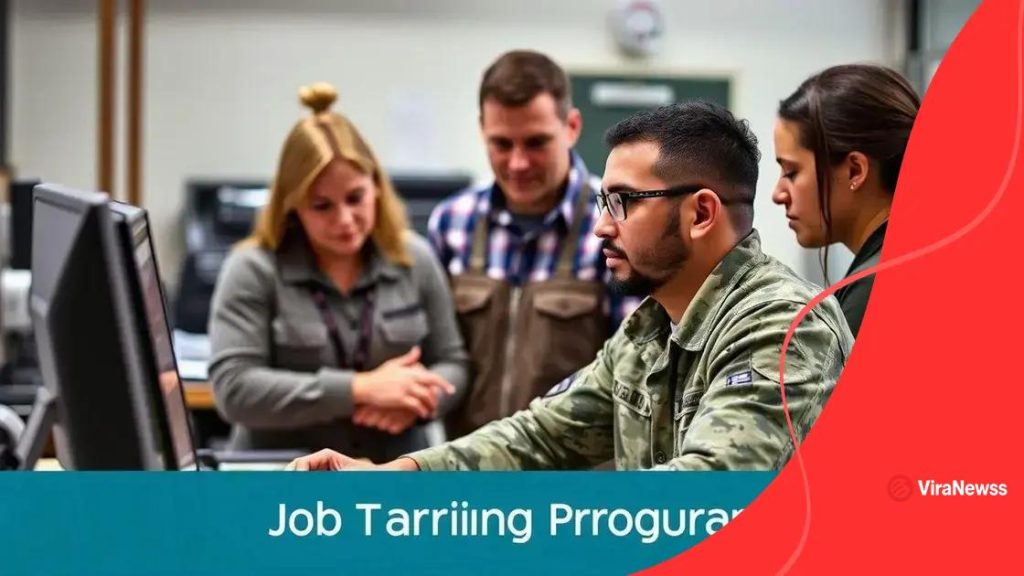New initiatives for veteran job training: find your path

Anúncios
New initiatives for veteran job training provide vital resources and programs that help veterans translate military skills into civilian employment, fostering successful transitions into the workforce.
New initiatives for veteran job training are making significant impacts on the lives of those who’ve served our country. Imagine having access to specialized programs that not only enhance skills but also smooth the transition into civilian careers. In this article, let’s explore the various opportunities available that can guide veterans toward fulfilling job paths.
Anúncios
Understanding the need for veteran job training
Understanding the importance of veteran job training is essential as many service members transition back to civilian life. With unique skills and experiences, veterans often need support to navigate the job market. This training can bridge the gap between military expertise and industry requirements, making it easier for them to secure meaningful employment.
Why is Veteran Job Training Necessary?
Many veterans face challenges when re-entering the civilian workforce. Their backgrounds may not directly translate into civilian jobs, leading to a skills gap. Additionally, some veterans have been out of the job market for years, and the landscape has changed significantly. Training programs are specifically designed to help veterans acquire the necessary skills to adapt.
Key Benefits of Veteran Job Training
Veteran job training provides multiple benefits, including:
Anúncios
- Improved job readiness through practical skill development.
- Networking opportunities with industry professionals.
- Access to resources tailored for veterans.
- Confidence building through hands-on training experiences.
When veterans participate in these programs, they gain vital knowledge that increases their employability. Employers also value candidates who have gone through such training as they often bring discipline and unique problem-solving abilities.
Tailored Training Programs
Various organizations offer tailored training programs for veterans. These include vocational schools, community colleges, and nonprofit organizations. Some key aspects of successful programs are:
- Curriculums designed around the skills that are in demand.
- Flexible schedules to accommodate veterans’ needs.
- Mentorship from experienced professionals who understand military backgrounds.
- Internships or hands-on experiences to bolster resumes.
By understanding the need for veteran job training, we can better support those who have served. This understanding paves the way for more effective programs that lead to successful employment outcomes for veterans.
Innovative programs supporting veteran employment
Innovative programs that support veteran employment are changing the landscape of job training and placement for those who have served in the military. These programs are designed to meet the unique needs of veterans, helping them transition more smoothly into new careers. With the right training, veterans can leverage their skills and experiences to succeed in the civilian workforce.
Types of Innovative Programs
There are several types of programs aimed at enhancing veteran employment opportunities. Different organizations offer tailored solutions that cater to the diverse needs of veterans:
- Online training and certification programs that allow flexible learning.
- Workshops that focus on resume writing, interview skills, and personal branding.
- Internships that provide real-world experience in various industries.
- Networking events to connect veterans with potential employers.
These programs not only equip veterans with the necessary tools but also create a community for support and encouragement. Accessing these resources can be a game changer for many.
Partnerships with Private Sectors
Innovative programs often partner with businesses to enhance job opportunities for veterans. Companies recognize the value that veterans bring and are eager to hire those with military backgrounds. Some notable aspects of these collaborations include:
- Job fairs specifically aimed at veterans.
- Employer-sponsored training initiatives that bridge the skills gap.
- Mentorship programs that offer guidance and support.
By fostering relationships between veterans and the private sector, these programs create pathways for successful career transitions.
Success Stories of Innovative Programs
Many success stories highlight the benefits of innovative programs aimed at supporting veteran employment. Veterans who have participated in these initiatives often report significant improvements in their job prospects. Some key outcomes include:
- Higher employment rates compared to veterans not engaged in these programs.
- Increased confidence in their job-related skills.
- A greater sense of community and belonging among peers.
These stories inspire others and showcase the positive impact of well-structured support systems for veterans.
Skills development for transitioning service members

Skills development for transitioning service members is critical as they move from military to civilian life. These individuals possess a range of experiences and abilities that can be highly valuable. However, translating military skills into civilian job competencies can be challenging. Targeted training programs play an essential role in helping them adapt.
Identifying Transferable Skills
One of the first steps in skills development is identifying transferable skills. Many service members bring invaluable qualities such as leadership, teamwork, and problem-solving. Understanding how these align with civilian job descriptions can help in the transition.
- Leadership experience from managing troops.
- Teamwork skills cultivated through collaborative missions.
- Advanced problem-solving under stress.
- Technical skills learned during service.
These attributes are highly sought after by employers and can broaden job opportunities significantly.
Training Programs Focused on Skill Enhancement
Numerous training programs are available that focus on enhancing the skills of transitioning service members. These programs often customize their offerings to cater to the unique backgrounds of veterans.
- Workshops that teach resume writing and interview techniques.
- Online courses for specific job-related skills.
- Hands-on training for in-demand industries like technology and healthcare.
These training initiatives not only improve job readiness but also instill greater confidence in service members as they prepare for their new careers.
Networking and Mentorship Opportunities
Participating in skills development programs often provides access to networking and mentorship opportunities. Connecting with professionals in various industries through these programs can be beneficial. Mentors offer valuable insights and guidance, helping service members navigate their career paths. Building these connections can lead to job openings and supportive relationships that last beyond training.
As transitioning service members develop their skills, they gain a deeper understanding of the civilian job market. This knowledge, combined with their unique military experiences, positions them for success in their new careers.
Success stories of veterans in new careers
Success stories of veterans in new careers can inspire many who are navigating their own transitions. These stories highlight how veterans have rejoined the workforce, showcasing their resilience and adaptability. Each journey is unique, but many veterans share common themes of determination and support.
Highlighting Individual Journeys
Many veterans have successfully moved into civilian jobs, utilizing the skills and experiences gained during their service. These transitions often involve overcoming various challenges. Here are some examples of their journeys:
- A veteran who became a project manager in a technology firm after completing a certification program.
- A former service member who discovered a passion for cooking and opened a successful restaurant.
- A soldier who utilized their diagnostic skills to thrive in engineering roles.
Each of these stories illustrates the diverse paths veterans can take when they receive the right support and resources.
Impact of Training Programs
Training programs play a crucial role in helping veterans transition into new careers successfully. These initiatives provide essential skills and connect individuals to potential employers. Many veterans have shared how these programs made a significant difference in their journeys.
- Real-world experience gained during internships opened doors to full-time positions.
- Networking events led to valuable connections with industry leaders.
- Workshops provided practical skills that directly applied to job roles.
Veterans often express gratitude for the programs that equipped them for success in their new endeavors.
Community Support and Resources
Support from family, friends, and dedicated organizations can also contribute to veterans’ success. Building a community around them helps in several ways. This network often provides:
- Moral support and encouragement during job searches.
- Information about resources available for skill development.
- Opportunities to connect with other veterans who can share their experiences.
As veterans share their success stories, they inspire others who may be facing similar challenges. Their examples prove that with determination, skills development, and a supportive community, new and fulfilling careers are achievable.
Resources for veterans seeking job training
Resources for veterans seeking job training are essential in helping them successfully transition to civilian employment. Many organizations, both government and nonprofit, provide vital support to veterans in these programs. Accessing these resources can be a game changer in the job search journey.
Government Programs
The government offers several programs designed specifically for veterans. These initiatives help veterans understand their eligibility for various job training options. Some key resources include:
- The Department of Veterans Affairs (VA), which provides educational benefits for training programs.
- Vocational Rehabilitation and Employment (VR&E) services to help veterans with service-connected disabilities.
- Jobs for Veterans State Grants, which support job training programs statewide.
These programs enable veterans to gain valuable skills and certifications that enhance their employability.
Nonprofit Organizations
Many nonprofit organizations also play a crucial role in supporting veterans. They often offer training programs tailored to the needs of veterans. Here are a few organizations that have proven helpful:
- Goodwill Industries, which provides job training and placement services.
- Veteran Women Igniting the Spirit of Entrepreneurship (V-WISE) that focuses on helping veteran women start their own businesses.
- Team Rubicon, creating opportunities for veterans to use their skills in disaster response and community service.
These nonprofits not only offer training but also foster a sense of community among veterans.
Online Resources and Courses
In today’s digital world, online resources have become increasingly important. Veterans can access training materials and courses from the comfort of their homes. Websites offering free or low-cost courses, such as:
- Coursera, which partners with universities to provide a range of subjects.
- edX, offering professional certifications and online classes.
- LinkedIn Learning, enabling skills development in various fields.
These platforms offer veterans flexibility and the chance to learn at their own pace, which can lead to new job opportunities.
By leveraging various resources for veterans seeking job training, individuals can enhance their skills and successfully enter the job market. Each resource provides unique benefits that cater to the diverse needs of veterans, making a significant impact on their paths to new careers.
In conclusion, the journey from military service to civilian employment can be challenging, but resources are available to support veterans every step of the way. From tailored training programs to networking opportunities, these initiatives help veterans translate their military skills into valuable job qualifications. By leveraging these resources, veterans can find success in their new careers and contribute positively to society. Remember, there are always options to explore, and with determination and support, veterans can achieve their professional goals.
FAQ – Frequently Asked Questions about Veteran Job Training
What resources are available for veterans seeking job training?
Veterans can access government programs, nonprofit organizations, and online courses tailored to their needs.
How can training programs help veterans?
Training programs equip veterans with skills, enhance their employability, and provide networking opportunities.
Are there success stories of veterans in new careers?
Yes, many veterans have successfully transitioned into various industries, leveraging their military skills and experiences.
What role does community support play in a veteran’s job search?
Community support fosters connections, provides encouragement, and offers valuable resources to help veterans succeed.





